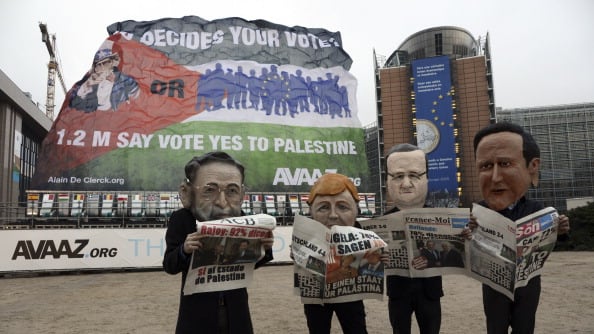(UPDATED BELOW.) The Palestinian Authority isn't fighting a numbers game when it comes to their bid to join the U.N. General Assembly as a non-member observer state. When the resolution is put to a vote at the General Assembly tomorrow, it will pass with a comfortable margin, as 131 countries already recognise Palestine as an independent state under occupation. Predictably, the U.S. has declared it will vote no, and has pressed European partners to do the same. But the PA has been in a determined diplomatic battle to win the political support of the key Western bloc.

As much as possible, the European Union tries to project a common position at the U.N., but often fails when it comes to resolutions involving Israel and Palestine (the vote on the Goldstone Report resolution in 2010 was a notable moment). Though the 2011 statehood bid was never put to a vote at the Security Council, European members were expected to vote against it there. But in the subsequent vote where the PA sought and received membership to UNESCO in October 2011, the European vote was significantly split. Eleven countries (Austria, Belgium, Cyprus, Finland, France, Greece, Ireland, Luxembourg, Malta, Slovenia and Spain) voted yes, another eleven abstained (Bulgaria, Denmark, Estonia, Hungary, Italy, Latvia, Poland, Portugal, Romania, Slovakia and the United Kingdom) and five voted no (Czech Republic, Germany, Lithuania, the Netherlands and Sweden).
This year's resolution, despite being something of an anticlimax, has prompted much handwringing and mixed messaging from European governments. Denmark, France, Spain Norway and Switzerland (the latter two are not EU member states) have declared their support. It's reasonable to expect that the states who supported the UNESCO bid will also vote yes, with the exception of Belgium who have declared they will abstain. And the Netherlands can be expected to move from the 'no' to the 'yes' category after a change of government earlier this year. The United Kingdom and Germany were wavering, declaring they would support the resolution with given public assurances that the PA would seek unconditional negotiations with Israel and forego applications to the International Criminal Court. At the time of this writing, the Palestinians have not agreed to condition their bid, which would curtail the meaningful gains of the upgrade, so Germany and the U.K. are at best likely to abstain.
What drives the splits and shifts in European state positions, and how should they be interpreted? It's no secret that many European states are disenchanted with the moribund peace process. But the Oslo framework has not gone out of fashion for key European actors, who see the PA as integral a negotiated settlement. Accordingly, there is also considerable alarm among European policymakers that the Palestinian Authority that they have so heavily supported financially finds its legitimacy increasingly strained (not least in the last round of violence in Gaza, where the PA was dramatically and visibly sidelined). Supporting the PA bid this year would have been a relatively low-cost measure to bolstering Mahmoud Abbas and sending a message to Israel that European actors are not copasetic with the status quo.
The PA will see the shifting positions of major European states like France as a boon, but not all EU member state votes are created equal, and without the support of heavyweights like the United Kingdom and Germany the victory is less dramatic. Israel can take continued comfort in the stalwart support of key European countries, even in a year where EU also introduced regulations demanding that exports from settlements in the Occupied Territories must be accordingly labeled and is also reportedly considering introducing visa bans on violent settlers.
UPDATE: Since writing, the German government has stated it will abstain instead of voting no as was previously reported, and diplomatic sources say a yes vote was never an option even with conditions. Belgium has stated it will be voting yes instead of abstaining. The Dutch and Swedish positions are not confirmed but they are likely to abstain.






